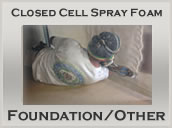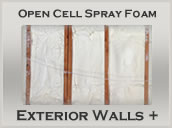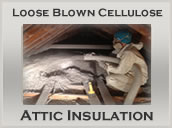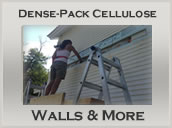Shaping Energies has insulated hundreds of buildings in Vermont and we offer a wide range of insulation contracting services. Right now every house in Vermont qualifies for financial incentives of up to $2,000.00 from Efficiency Vermont to insulate! Plus, everyone who signs up for an insulation project before January 17th (or until our schedule is full) gets FREE Home Performance testing to include a blower door test-in and test-out (value of $500.00!) to qualify you for Efficiency Vermont incentives. We do all the paperwork. You just sit back and your check comes in 2-6 weeks!
You can even calculate your project cost on our website now! And schedule your project! We will call you to verify the details of your project within 24 hours. Click the buttons abov e for more information about our specific insulation services and to sign up.
Insulation Contracting
If you think you are using way too much fuel to heat your home it is extremely likely that you have inadequate insulation somewhere in your house. Many older homes are not well-insulated, and some have no insulation at all. Properly installed insulation in walls and attics provides for more even temperatures throughout the house and results in a quieter, more comfortable living environment that is easier to heat and cool. Other extremely important benefits of properly insulating your attic, your foundation, and your exterior walls, include the the array of benefits listed at the bottom of this page (you will get a kick out of them; it's more than you think).
Properly installed attic insulation:
- Reduce heat loss through the ceiling.
- Reduce snow melting and ice forming on the roof.
- Reduce roof damage and the need for a new roof.
- Reduce the possibility of water backing up into the roof from ice forming and getting into the walls and damaging the walls (and the wall insulation) and causing mold issues when gone undetected or improperly handled.
- Reduce the possibility of condensation at the interior side of the ceiling because the temperature change across the ceiling is past the wet bulb threshold and dew point.
- Reduce the need for attic ventilation (primarily additional attic ventilation). The amount of attic ventilation that you are supposed to have is governed by a couple of simple rules, and you never need more, period.
Properly insulated foundation walls:
- Reduce heat loss from the foundation to outside.
- Keeps your basement warmer in the winter; it generally becomes the warmest room in the house because your furnace and hot water pipes are down there.
- Keeps the air cleaner for your heating system to burn with.
- Reduces the relative humidity of the air in the basement (and by default improves the overall air quality in your home [less moisture means less funny smells])
- Reduces the possibility of condensation on in the basement.
- Reduces the possibility of structural or framing members wicking enough moisture from the air to compromise their integrity (framing members should generally be below 17% moisture content if/when tested).
- Reduces the possibility of rotting structural and/or framing members.
- Reduces the moisture content of the air that the furnace or boiler burns with; this improves the combustion efficiency of your heating system and reduces corrosion inside the heating system. Higher heating system efficiency also reduces carbon monoxide and soot which increases the need for you to clean your system and further reduces its efficiency. Soot on the heat exchanger reduces the system's efficiency, and soot on the burner nozzle can impede the gas flow and damages the flame which further reduces the system's efficiency. Carbon monoxide can be a safety hazard if it escapes the chimney and ends up in your home, and problems with combustion efficiency due to basement moisture, carbon monoxide, and soot, all lead to fluctuations in stack temperature and higher chances of corroding the heat exchanger which increases the chances that the heat exchanger will crack and carbon monoxide will start escaping the chimney through the heat exchanger and pump directly to your supply registers - if you have a furnace - further creating health and safety hazards in your home.
Properly insulated wood framed exterior walls:
- Reduce heat loss to outside
- Reduce air movement in the walls
- Reduce the possibility of moisture in the air migrating condensing on the interior side of the sheathing at the exterior side of the wall cavity; this reduces the possibility of mold forming in this same location.
- Reduces sound transfer (noise) from outside.
Hopefully you can see that there is more benefit to properly insulating your home than simply saving on your heating bills, but saving money is also a great benefit of proper insulation!
We would be honored to install insulation in your home and thrilled to provide you with a free estimate. Please visit our pages on basement insulation, exterior wall insulation spray foam, attic insulation, or blown-in wall insulation to get instant pricing and sign up, or if you are simply considering hiring an insulation contractor call us with and we will be happy to answer all your questions!






